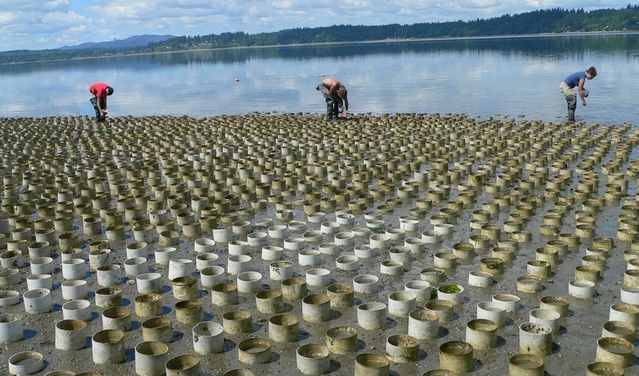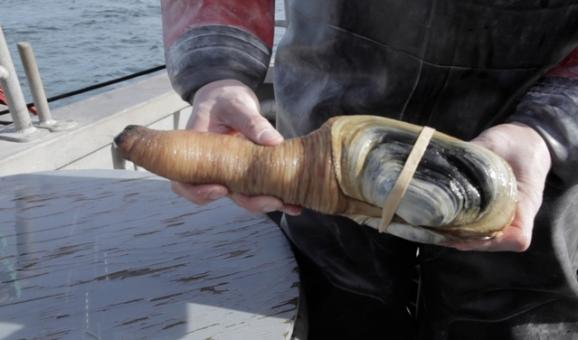Washington geoduck farmers and harvesters have turned to politicians to help overturn a Chinese shellfish-import ban that’s all but shut down the local industry.
By Jay Greene, December 14, 2013 the Seattle Times
Washington geoduck harvesters and government officials, including Gov. Jay Inslee, are scrambling to overturn China’s decision to ban some shellfish exports from the Pacific Northwest.
The ban has brought the geoduck industry here to a virtual halt.
Fish inspectors in China notified the U.S. Embassy on Dec. 3 that China was tentatively suspending imports of geoduck and other “double-shell aquatic animals,” such as oysters, because they found high levels of paralytic shellfish poisoning, or PSP, in a Nov. 21 shipment of geoducks.
PSP is a biotoxin produced by algae that shellfish eat and, in humans, in high levels it can lead to severe illness and even death.
KUOW first reported news of the ban.
The ban is a particularly nettlesome problem in Washington because China accounts for about 90 percent of geoduck exports from the state. And fisheries in the state harvest and farm 5.5 million to 7 million pounds of geoduck annually, according to Taylor Shellfish Farms, one of the state’s largest geoduck providers. Those companies generally sell geoduck, which is a burrowing clam, for between $7 and $25 a pound.
The ban also affects Alaskan shellfish.
Local fish companies, though, are struggling to understand the ban because testing by the Washington State Department of Health in the area where the geoduck shipments originated found PSP levels well below internationally accepted limits.
“We’ve gone back and looked at all records — they show results way below any human-health concern,” Donn Moyer, a health-department spokesman, said Saturday. “We don’t have any evidence or information whatsoever about any high levels of PSP in any shellfish.”
Geoduck harvesters believe the Chinese inspectors applied a standard for the level of toxicity that is well below what is considered safe for humans.
“The numbers I saw (that Chinese inspectors used) are just plain ridiculous,” said Tony Forsman, general manager of Suquamish Seafoods, a business run by the Suquamish Tribe.
To compound the challenge, communication from the Chinese government has been scant. State regulators and fishery executives say they have heard nothing more from the Chinese since the Dec. 3 notification. Press officials from the Chinese embassy in Washington didn’t respond to an email query Saturday.
That’s led the industry to turn to political leaders to resolve the issue. On Friday, the governor and Commissioner of Public Lands Peter Goldmark sent a letter to the heads of the Food and Drug Administration and the National Oceanic and Atmospheric Administration asking them to engage in “direct interaction with the Chinese government” to determine the status of the ban and to gather information about the Chinese inspection.
In the meantime, local geoduck harvesters and farmers are curtailing operations. Suquamish Seafoods, which sends all of its geoduck, between $2 million and $3 million a year, to China, has idled its 24 divers.
“This is unprecedented,” Forsman. “The tribe really depends on it.”
Taylor Shellfish Farms, which sells some geoduck domestically, has had to reduce hours for its workers. And if the Chinese ban continues much longer, prices for geoduck sold domestically will drop because of a market glut.
“That may have an impact on domestic prices,” said Bill Dewey, Taylor’s director of public policy and communications.
Staff reporter Carol M. Ostrom contributed to this report. Jay Greene: 206-464-2231 or jgreene@seattletimes.com. Twitter: iamjaygreene


